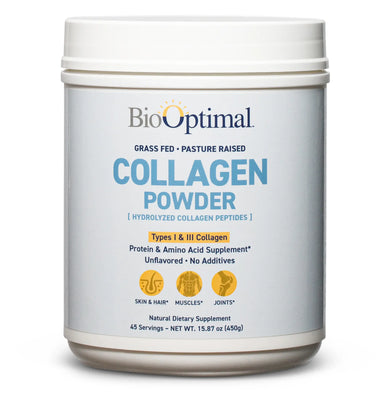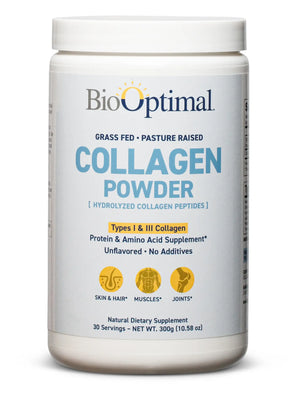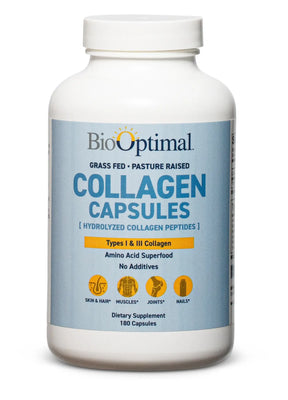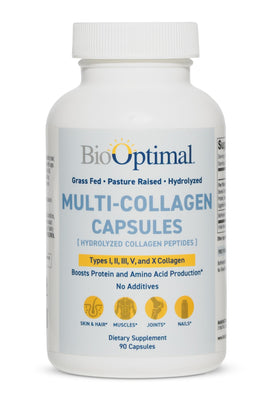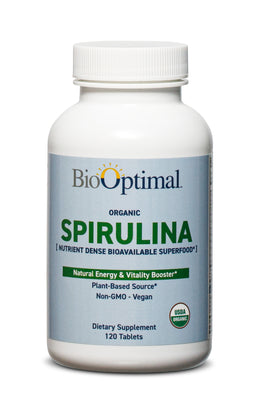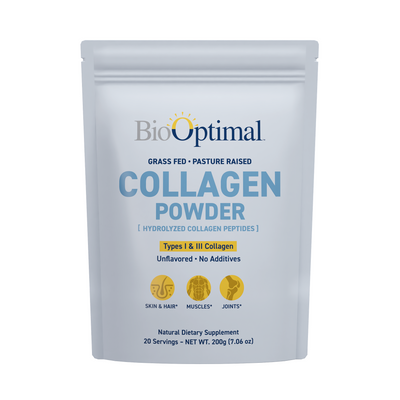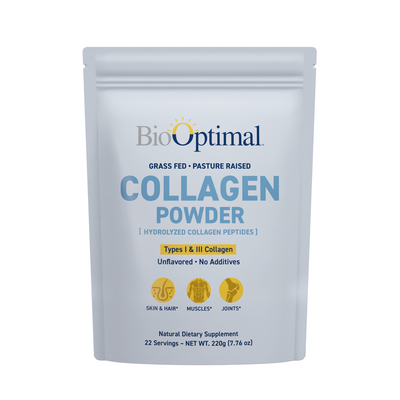Table of Contents:
- What Are Protein Powders?
- What Is Collagen Powder?
- Protein vs Collagen: Amino Acid Profiles & Key Benefits
- Benefits of Mixing Protein and Collagen Powders
- How to Mix Protein Powder and Collagen Powder
- Optimal Dosing & Timing
- Potential Downsides & Considerations
- Expert Insights on Combining Supplements
- Frequently Asked Questions (FAQs)
- Wrapping up
If you’ve ever wondered, “Can you mix protein powder and collagen powder?” the short answer is yes. Combining both supplements in one drink is a simple, efficient way to support muscle recovery and skin health at the same time. While traditional protein powders (like whey or plant-based varieties) help rebuild muscle and aid performance, collagen peptides provide unique benefits for joint, skin, and connective tissue health. The Journal of Medical Nutrition & Nutraceuticals (2015) published a research that found that collagen peptides improve skin hydration after 8 weeks and reduce wrinkle volume after just 4 weeks—highlighting their cosmetic value.
By mixing the two, you don’t have to choose between fitness and beauty goals. They complement each other without interfering with absorption or function. This article explains why combining them works, how to correctly do it, and what benefits you can expect.
What Are Protein Powders?
Protein powders are dietary supplements that support muscle repair, growth, and recovery—especially after exercise. The most commonly found types include whey, casein, and plant-based proteins (like pea, rice, or hemp). Whey protein get quickly absorbed, making it ideal post-workout, while casein digests slowly and is often used at night. Plant proteins cater to vegans and those with dairy sensitivities.
These powders are rich in branched-chain amino acids (BCAAs)—leucine, isoleucine, and valine—crucial for triggering muscle protein synthesis. A solid amino acid profile ensures your body has the right building blocks for recovery and strength.
The global protein supplements market was valued at USD 27.8 billion in 2023, reflecting the growing demand for protein-based products. More fitness enthusiasts are now turning to protein collagen blends, which combine traditional protein with collagen for broader benefits. A whey and collagen mix offers muscle-supporting BCAAs and collagen-specific amino acids like glycine and hydroxyproline.
What Is Collagen Powder?
Collagen powder is made from hydrolyzed collagen peptides, meaning the protein get broken down into smaller, more digestible pieces for easier absorption. It typically comes from bovine, marine, or porcine sources and is critical in maintaining healthy skin, joints, ligaments, and bones. Unlike traditional protein powders, collagen contains high glycine, proline, and hydroxyproline—amino acids that support connective tissue repair and elasticity.
While collagen isn’t a complete protein due to its limited amino acid profile, it still complements other protein sources well. A whey and collagen mix provides both the muscle-building benefits of BCAAs and the structural support collagen offers.
The global collagen supplement market reached USD 2.85 billion in 2023, highlighting the rising interest in collagen’s cosmetic and joint health benefits. Combining both in a protein collagen blend is a popular strategy for active individuals who want to support appearance and performance.
Protein vs Collagen: Amino Acid Profiles & Key Benefits
The following are some of the key benefits of protein and collagen to help you make an informed choice:

Complete Proteins: The Muscle Builders
Traditional protein powders like whey, casein, and plant-based blends are considered complete proteins. This means they contain nine essential amino acids which the body cannot produce independently. These supplements are especially rich in BCAAs (branched-chain amino acids)—leucine, isoleucine, and valine—vital for muscle recovery, growth, and muscle breakdown. A strong amino acid profile supports post-workout repair and performance, making these proteins a staple in fitness nutrition.
Collagen Peptides: The Structural Supporters
In contrast, collagen peptides are not complete proteins but are uniquely rich in glycine, proline, and hydroxyproline—amino acids not commonly found in high amounts in other protein sources. These amino acids are crucial for forming and maintaining connective tissues like skin, ligaments, tendons, and cartilage. Collagen’s benefits are more structural and cosmetic, playing a key role in joint support, skin elasticity, nail strength, and gut lining integrity.
Which One Is Better?
It’s not a matter of one being superior to the other—it’s about function. While complete proteins fuel muscles, collagen peptides target connective tissue health. A protein collagen blend allows you to enjoy the best of both worlds. The combination balances the muscle-building properties of complete proteins with the tissue-repairing effects of collagen, offering a more well-rounded approach to daily supplementation.
Benefits of Mixing Protein and Collagen Powders
Including a combination of protein and collagen powders as supplements is beneficial. The following are the advantages to consider:
Full-Spectrum Muscle and Tissue Repair
Combining traditional protein powder with collagen peptides creates a robust muscle recovery and joint support formula. While your muscles benefit from BCAAs, collagen’s unique amino acids help strengthen tendons and ligaments—vital for injury prevention and long-term performance.
Skin, Nails, and Gut Health
A whey and collagen mix doesn’t just help you achieve your gym goals. It also contributes to skin elasticity, supports nail health, and, due to the presence of glycine, may improve gut barrier function. This makes a protein collagen blend an excellent addition for those aiming for both aesthetic and wellness benefits.
How to Mix Protein Powder and Collagen Powder
Blending protein powder and collagen powder is straightforward and can be easily added to your daily routine. Add your preferred liquid to a shaker or blender—water, almond milk, or even cold brew coffee all work well. Next, add one scoop of protein powder, followed by a scoop of collagen peptides. Shake or blend thoroughly to avoid clumping and ensure a smooth texture.
Consider flavor hacks like adding cinnamon, cocoa powder, or vanilla extract to improve taste. Unflavored collagen ends well with most flavored protein powders without altering the taste. You can also toss in fruit or oats if you're making a smoothie.
With 21% of U.S. adults using protein powders and 13% using collagen supplements (Statista, 2022), combining the two is an efficient way to cover more nutritional bases in one drink. A well-mixed whey and collagen blend can be enjoyed post-workout or as a meal component.
Optimal Dosing & Timing
To get the most out of your protein collagen blend, it’s essential to follow proper dosing and timing. Research suggests that 20–30 grams of protein powder per serving is ideal for supporting muscle recovery, especially post-workout. For collagen, 10–15 grams of collagen peptides daily has been linked to improved joint support and skin elasticity.
Timing matters, too. Protein is most effective when consumed within 30 minutes after exercise, while collagen can be taken in the morning with coffee, before bed, or post-workout if you're targeting joint and connective tissue recovery.
With 21% of U.S. adults using protein powders and 13% using collagen supplements (Statista, 2022), there’s a clear appetite for strategic supplementation. By spacing or combining them thoughtfully, users can support performance, recovery, and long-term health in one daily habit.
Potential Downsides & Considerations
While combining protein and collagen powders can be beneficial, a few important factors should be considered before making it a daily habit.

1. Total Protein Intake Matters
Blending two supplements means you’re consuming more overall protein. While this can be helpful for muscle recovery and joint support, tracking your total daily intake is crucial. Most adults need 0.8 to 1.6 grams of protein per kilogram with respect to body weight, based on activity levels. Consistently exceeding your needs may strain the kidneys or cause unnecessary calorie intake.
2. Cost Comparison
Using both protein powder and collagen peptides daily can be expensive over time. A quality whey and collagen mix could cost more than just one supplement. Comparing brands and buying in bulk can help reduce costs, but it’s still a consideration for budget-conscious consumers.
3. Digestive Sensitivity
Some people experience bloating, gas, or discomfort when using protein or collagen—especially if lactose is present in whey, or if collagen is poorly sourced. Starting with smaller doses and observing your body’s response can help reduce digestive issues. Look for powders labeled as hydrolyzed (pre-digested) for better absorption.
4. Supplement Quality & Certifications
Choose third-party tested products and carry certifications like NSF Certified for Sport or Informed Choice. This ensures the protein collagen blend is free from contaminants, accurately labeled, and safe for regular use.
Expert Insights on Combining Supplements
Nutrition professionals generally support combining protein and collagen powders, especially when the goal is to help both muscle and connective tissue health. According to registered dietitian Sarah Currie, MS, RD, “A protein collagen blend offers a practical way to get complete amino acids from protein and targeted compounds like glycine and hydroxyproline from collagen, which support joint and skin health.”
Sports nutritionist Ben Carpenter adds, “There’s no evidence that combining the two interferes with absorption. In fact, a whey and collagen mix can complement each other nicely for people focused on muscle recovery and joint support.”
Experts recommend choosing high-quality supplements and being mindful of total protein intake. Depending on your goals, they also suggest mixing them post-workout or in the morning. When used correctly, the combination can serve various wellness objectives, from fitness performance to skin elasticity and overall mobility.
Frequently Asked Questions (FAQs)
1. Can I take both collagen and protein powder together?
Yes, taking both is safe and beneficial. Protein powder supports muscle synthesis, while collagen peptides contribute to joint, skin, and connective tissue health. Combining them gives you a more complete amino acid intake and targets multiple body systems with one convenient supplement routine.
2. What should not be taken together with collagen?
There are no significant conflicts when taking collagen. Vitamin C uplifts collagen synthesis. The key is to avoid exceeding your daily protein needs, especially if combined with supplements, to prevent digestive discomfort or excessive caloric intake. Constantly monitor your intake for balance.
3. Can you drink collagen with a protein shake?
Yes, mixing collagen into a protein shake is a convenient option. Combining muscle-repairing BCAAs with collagen’s connective tissue support creates a more well-rounded amino acid profile. It’s a simple way to support recovery, skin health, and mobility with one daily beverage.
4. Can you put collagen powder and protein powder in the same smoothie?
Absolutely. Add your liquid—like milk or water—followed by both powders. Blend thoroughly to ensure smooth texture and prevent clumps. A whey and collagen mix in smoothies provides flavor and a full spectrum of benefits for skin, muscles, and joints.
5. When should you take collagen and protein powder?
Take protein powder post-workout to support muscle recovery, while collagen peptides can be taken anytime—morning, night, or after exercise. Timing depends on your routine, but what matters most is consistency in daily intake to achieve benefits like joint support and skin elasticity.
6. Why should you take collagen at night?
Taking collagen at night may align with the body’s natural repair cycle during sleep, especially for skin and joint recovery. However, research shows that consistent daily use matters more than specific timing. Opt for a schedule that fits your lifestyle to stay consistent.
Wrapping Up
Combining collagen and protein powder is a practical way to support muscle recovery and long-term joint, skin, and connective tissue health. While protein have essential amino acids for building muscle, collagen offers unique compounds like glycine and hydroxyproline that support structural repair. Together, they form a balanced supplement routine that fits into any fitness or wellness plan. Just be mindful of total protein intake and choose high-quality products.
Looking for a clean, effective protein collagen blend you can trust? Try BioOptimal Supplements—crafted with premium ingredients and backed by real results. Fuel your body, inside and out.


